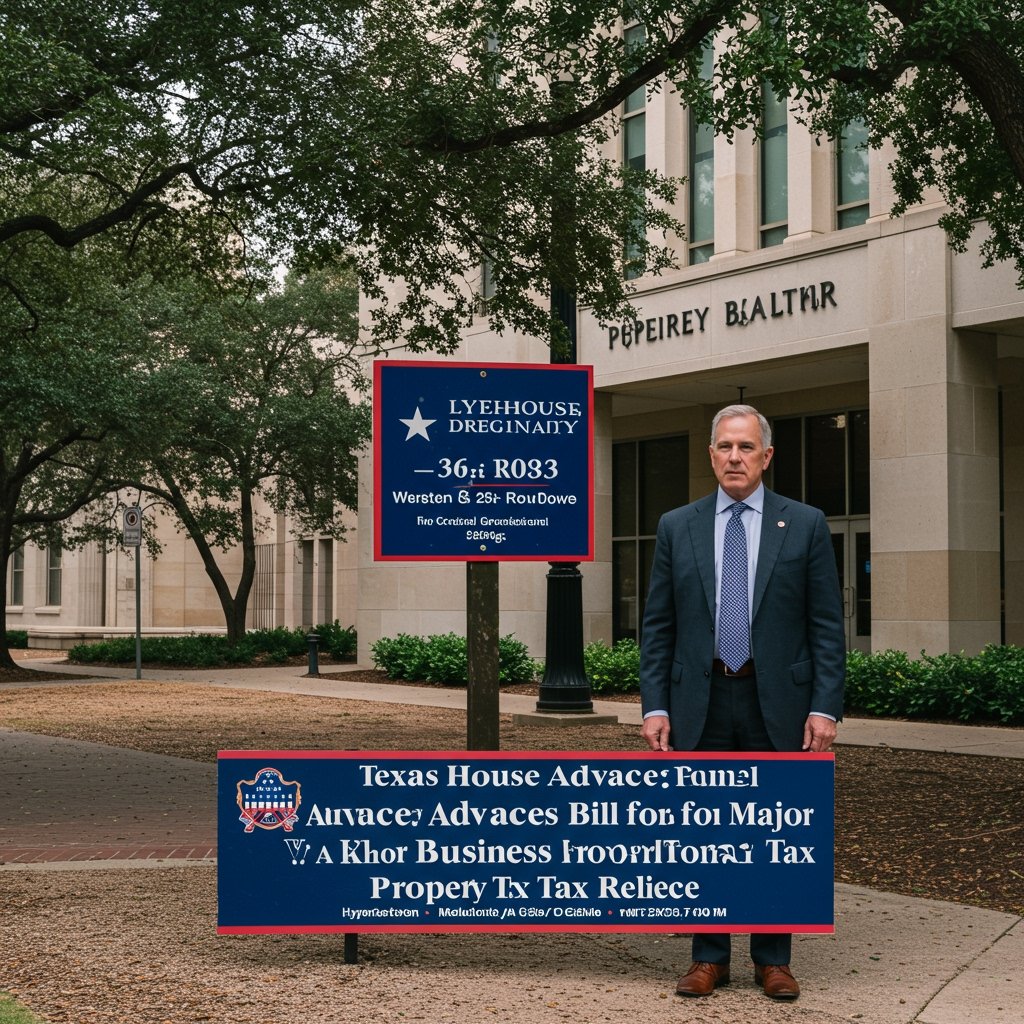Bill Advancing Through Texas House
AUSTIN, Texas – A significant legislative effort aimed at reducing the property tax burden on Texas businesses took a crucial step forward on Monday as the House Ways & Means Committee advanced House Bill 1420 to the full House floor. Chaired by Representative Jane Doe, the powerful committee deliberated on the proposed legislation, which seeks to provide substantial relief to commercial property owners across the state. The bill’s passage out of committee with a decisive 8-3 vote signals growing momentum for tax reform measures specifically targeting the business sector, potentially impacting a wide array of industries from manufacturing to retail. The committee’s action sets the stage for a broader debate in the Texas House of Representatives on the future of business taxation and its impact on the state’s economic landscape.
Details of HB 1420: Capping Commercial Appraisals
The core of HB 1420 lies in its proposal to implement a 15% reduction in the state’s maximum appraisal cap specifically for commercial properties. Under current Texas law, residential homesteads benefit from a 10% annual cap on the increase in their appraised value for property tax purposes. However, commercial and other non-homestead properties typically do not have such a protective limit, leaving them vulnerable to potentially volatile and substantial increases in their taxable value year over year. HB 1420 seeks to extend a form of appraisal limitation to businesses, albeit at a different percentage and mechanism, aiming to create more predictability and stability in their property tax liabilities. Proponents argue this change is essential for long-term business planning and investment, preventing taxes from escalating rapidly due to market fluctuations or property improvements.
Industry Support and Economic Rationale
The proposed 15% reduction in the commercial appraisal cap has garnered strong support from various business advocacy groups, most notably the Texas Association of Business. Representatives from the organization have been vocal proponents of HB 1420, arguing that reducing the property tax burden on businesses is a critical step toward fostering economic growth. They contend that high and unpredictable property taxes can be a significant barrier to investment, expansion, and job creation. Specifically, the Texas Association of Business asserts that this measure will incentivize investment in key sectors such as manufacturing and retail. By lowering the effective tax rate through an appraisal cap, businesses would theoretically have more capital available to invest in equipment, facilities, and workforce development, thereby stimulating economic activity and enhancing Texas’s competitiveness on a national and international stage.
Local Government Concerns and Proposed Mitigation
While the business community largely backs HB 1420, the bill has faced opposition from organizations representing local governmental entities. Opponents, including representatives from the Texas Municipal League, voiced significant concerns during the committee hearings. Their primary worry centers on potential revenue shortfalls for local governments. Property taxes are a vital funding source for cities, counties, school districts, and special districts, supporting essential services like public safety, infrastructure, and education. A reduction in the taxable value or growth of commercial properties, they argue, could lead to decreased tax revenues, potentially forcing local governments to either cut services or increase the tax burden on other property types, including residential homesteads, to compensate for the loss. The Texas Municipal League emphasized the importance of stable and predictable revenue streams for effective local governance and service delivery.
Committee Deliberation and Vote
The hearing on Monday before the House Ways & Means Committee provided a platform for both proponents and opponents to present their arguments regarding HB 1420. Committee members engaged with witnesses, seeking to understand the potential economic benefits and the fiscal implications for local governments. The debate included discussions on the fairness of the current tax system, the impact on small versus large businesses, and the mechanics of the proposed appraisal cap. Crucially, HB 1420 includes a provision designed to address the concerns raised by local governments about revenue losses. This provision proposes a state fund intended to backfill up to 50% of calculated city and county revenue losses specifically in the first year following the bill’s implementation. While this mitigation measure was included to alleviate some of the fiscal anxiety expressed by local officials, it did not entirely eliminate opposition. Following the robust discussion, the committee proceeded to a vote, with the result being 8-3 in favor of advancing the bill to the full House, indicating strong support within the committee for the proposed tax relief measure.
What’s Next for HB 1420
With the House Ways & Means Committee’s approval, HB 1420 now moves to the calendar committee before potentially being scheduled for a debate and vote by the full Texas House of Representatives. If the bill passes the House, it would then proceed to the Texas Senate for consideration. The legislative process ahead will likely involve further debate, potential amendments, and continued advocacy from both supporters and opponents. The outcome of HB 1420 will have significant ramifications for Texas businesses, local government finances, and the state’s overall tax structure. The focused effort by Representative Jane Doe and the committee members in advancing this bill highlights the ongoing legislative push to find solutions for perceived inequities and burdens within the state’s property tax system, particularly as it applies to commercial enterprises.






